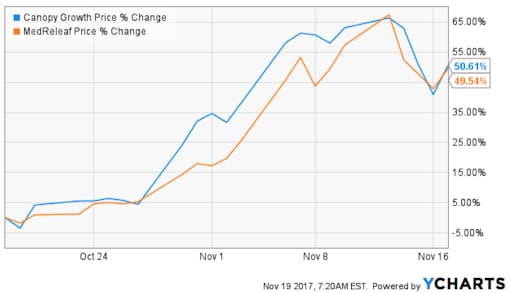When it comes to legal cannabis, Canada, which has a federally legal medical program and is on track to fully legalizing for adults next July, is the global leader. Unlike in the United States, where companies can sell their products only in the states where the cannabis is grown (and doing so is breaking federal law), Canadian companies licensed by Health Canada are able to sell throughout the country, which has a population of about 36 million. Many of them are also exporting product to Australia, Europe or Latin America.
Both stocks are up 50% in the past month, despite mildly disappointing reports.
Investors in the U.S. are increasingly focused on the market in Canada, where 25 licensed producers now trade publicly on the Toronto Stock Exchange (TSX), the TSX Venture (TSXV) or the Canadian Securities Exchange (CSE).
The two companies that are currently producing the highest level of sales reported their quarterly results last week, and the news from Canopy Growth (TSX: WEED) (OTC: TWMJF) and MedReleaf (TSX: LEAF) (OTC: MEDFF) was not as good as most analysts expected, yet both stocks rallied initially.
Even with a pullback later in the week, both stocks are up about 50% over the past month:

Despite the interest in Canadian stocks, it can be difficult for investors to find information on the financials beyond the press releases issued by the companies.
My goal today is to review the results and also show readers where they can find this information. Please note that I have no holdings in either of these stocks, but Canopy Growth is a client of mine at New Cannabis Ventures. Inclusion in this article is not a recommendation of either Canopy Growth or MedReleaf.
Canopy Growth: Big Year, Small Quarter
Canopy Growth reported sales in Q2 of its Fiscal Year 2018 ending 9/30 of C$17.6mm as described in this press release. This represented growth of 107% from a year ago, which was before the acquisition of Mettrum, but just 11% above sales in Q1.
Analysts had expected sales of C$19.8mm (this information is available for free here), so sales fell short by 11%. In addition to reading the press release, those doing research on Canopy Growth should listen to a replay of the conference call as well as review the Financial Statements and the Management’s Discussion and Analysis (MD&A) available at SEDAR.
Canopy Growth’s recent rally was sparked by an investment of C$245 million by Constellation Brands (NYSE: STZ) that was announced on 10/29. The lack of a big sell-off following seemingly disappointing results likely suggests that investors aren’t focusing on near-term financials. The weakness in the stock late in the week was more likely tied to equity or convertible debt sales announced by rivals.
Fighting for Patient Counts
Medical cannabis oils have been very popular in Canada, but they accounted for just 18% of sales at Canopy, down from 19% in Q1. On the conference call, CEO Bruce Linton also cited competition for new patients as a factor in the dampened results. “There are a number of parties out there…that are absolutely doing all they can” to show growth in patient numbers. “They’re engaging in a process that in my opinion, frankly, I just don’t understand.”
Tough competition: Some LP's are doing everything they can to boost total patient count.
Looking beyond sales, Canopy Growth reported a gross margin adjusted for changes in fair value of biological assets of 57% compared to 60% a year ago. The adjusted EBITDA, which excludes stock compensation and the fair value adjustment, was -C$6.2mm, with the company using C$10.48mm to fund its operations. Inventory was reported at C$73.8mm.
The company hasn’t provided official guidance on its total production capacity, but on the conference call suggested that it should be nearly 90 million grams by mid-2018. Analysts project sales of C$298 million and net income of C$10.3 million in the year ending March 2019.
Canopy Growth, which closed at C$18.45 on 11/17, has 187.6 million shares outstanding, giving it a market capitalization of C$3.46 billion. Including 14.8 million options (C$6.17 average exercise price) and the 18.9 million warrants issued to Constellation Brands at C$12.98, there are 221.3 million fully-diluted shares. Excluding the cash that these exercises would bring into the company but adding the C$245 million to the end-of-quarter cash balance, Canopy Growth has approximately C$353 million in the bank.
MedReleaf: Down 10%
MedReleaf reported sales in Q2 of its Fiscal Year 2018 ending 9/30 of C$9.8 million as described in this press release. This represented growth of -9% from a year ago and -7% from Q1. Analysts had expected sales of C$10.3 million (this information is available for free here), so sales fell short of expectations by 5%.
In addition to reading the press release, those doing research on MedReleaf should listen to a replay of the conference call as well as review the Financial Statements and the Management’s Discussion and Analysis (MD&A) available at SEDAR.
The company reported that medical cannabis oils represented 18% of overall sales, up from 14% in Q1 but down 5% in terms of units sold, with the lack of more robust growth attributed to supply shortages of its popular Avidekel strain offset by a 24% increase in prices.
Ramping Up Capacity
Looking beyond sales, which were hurt by changes in the reimbursement prices and maximum daily prescription amounts for veterans, the company reported a gross margin adjusted for changes in fair value of biological assets of 72.2%, down from 77.9% a year ago. The adjusted EBITDA, which excludes stock compensation and the fair value adjustment, was C$685,000 with the company using C$4.34 million to fund its operations. Inventory was reported at C$21.6 million.
When its second facility is at full capacity, the company believes its total production could be 35 million grams per year. Analysts project sales of C$152 million and net income of C$33 million in the year ending March 2019.
MedReleaf, which closed at C$16.30 on 11/17, has 90.5 million shares outstanding, giving it a market capitalization of C$1.47 billion. Including 6.8 million options (C$6.36 average exercise price), there are 97.3 million fully-diluted shares. The company announced on 11/14 that it is selling 3.6 million shares at C$16.55 each, for gross proceeds of C$60 million. Excluding cash from potential options exercises but including the net C$56.4 million from the pending equity deal, MedReleaf has approximately C$130 million in the bank.
Investors Betting on Future, Not Present
Bottom line: Investors looking to capitalize on cannabis legalization are increasingly turning to Canada. The two largest licensed producers in terms of sales reported results last week that fell short of expectations, but analysts project substantial growth ahead.
Based on the evidence of this past week, it appears that investors are more focused on the legalization ahead in Canada as well as global opportunities than on near-term financial performance.
Next up: What we can learn from the MassRoots failure. Talk with you in two weeks.





